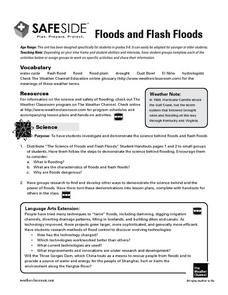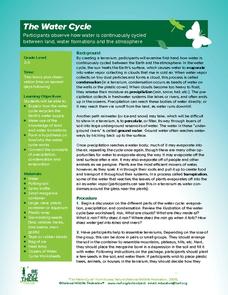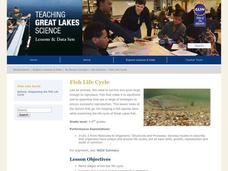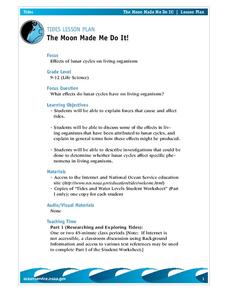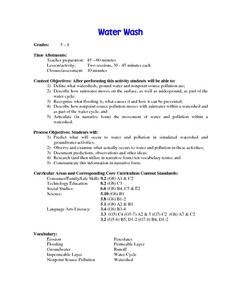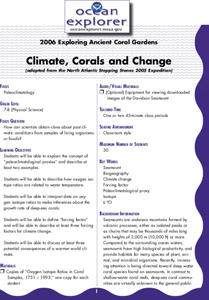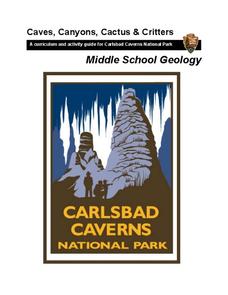Curated OER
Floods and Flash Floods
Junior geologists, hydrologists, or meteorologists simulate what happens during the flooding of a river and demonstrate factors that contribute to flash flooding. This outstanding resource provides a vocabulary list, online resources,...
Curated OER
The Other Water Cycle
Middle schoolers examine human impacts on the water cycle. They compare/contrast the permeability of various materials for the purpose of engineering landscape drainage systems, and answer discussion questions.
Curated OER
Flood Cycles 30/100 or Somewhere In Between
Students examine traditional flood cycles. They research floods that have occured between 30 and 100 years. They use a tool known as Climprob to study precipitation patterns that might cause floods.
Alabama Learning Exchange
Nature's Life Cycle
Become a member of the Pollution Patrol and stand up to litter! After discussing the life cycle of seeds and discussing how plants figure into the food chain, young conservationists engage in several activities involving podcasts,...
Curated OER
Exploring the Science of Water in Art: Water Cycle Lesson Plans
Water cycle lesson plans provide an opportunity for teachers to collaborate, and students to discuss this important resource.
Curated OER
Great Rivers 2: The Ups and Downs of River Flooding
Second in a three-part lesson on rivers, this lesson focuses on the flooding that occurs in riparian locations. First, learners take a look at facts about the Amazon River. They read online materials and fill in a worksheet as they...
NASA
Water Works on a Blue Planet
Keep within a water budget. Learners find out that less than 2.5% of Earth's water is available to drink—and that there is a fixed amount of water. Scholars read an interesting article comparing the available water to a game of Monopoly...
Curated OER
The Water Cycle
Students are introduced to the components and importance of the water cycle. They are shown how groundwater moves using a model. Students list 9 places on earth where water is found. They define the terms cycle and water cycle.
Curated OER
Water Cycle Drama
Students explore the water cycle. In groups, students choose a card and then pantomime the picture depicted on the card. Other group members guess the name of the cycle being performed. As a class, students share the numerous ways each...
Michigan Sea Grant
Fish Life Cycle
Fish are no different when it comes to a living being's primary objective—to reproduce. They do differ, including from fish species to fish species, in their life cycles, survival tactics and reproductive strategies. After discussion of...
Curated OER
Geography: Water, Water Everywhere
Students discuss flooding and its causes. They view a Powerpoint presentation about floods and prevention methods. After creating a model with clay and pans, they investigate river behavior in various terrains with different amounts of...
Curated OER
The Moon Made Me Do It!
Students research about how lunar cycles affect living organisms. In this biology lesson, students prepare an oral presentation of their research results and analyses. They explore the forces that affect tides.
Curated OER
Hydrology: Flood Mitigation
Twelfth graders discuss the different factors that can contribute to major floods. In this ecology lesson plan, 12th graders analyze collected rainfall data. They complete a scavenger hunt after the lesson plan.
Curated OER
Hydrology: Flood Mitigation
Twelfth graders discuss the factors that affect flooding. In this environmental science lesson, 12th graders analyze rainfall data about flooding. They complete a scavenger hunt worksheet using the internet.
Curated OER
Water 1: Water and Ice
Students explore the states of water. In this science activity, students use observation, measurement, and communication skills to describe water as it changes from a solid to a liquid.
Curated OER
The Moon Made Me Do It!
Students research lunar cycles and how it effects living organisms. In this investigative instructional activity students prepare written reports on the lunar cycles and the relationship between animal behavior and reproductivity then...
Curated OER
Defining Drought
Students examine the hydrologic impacts of drought. They look at drought from a variety of prespectives. Students first focus on the scientific definition of drought, including weather patterns, water cycles, water requirements by plants...
Curated OER
Station: Earth's Interior
In this earth science worksheet, students cut out each die pattern and the signs for each station. Then they assemble the dice by folding along lines and taping the edges together. Students also follow the written instructions for...
Curated OER
Time and Cycles - Dendrochronology
Students investigate the lives of trees by examining ring cycles. For this plant life lesson, students identify the field of study known as dendrochronology and discover its history. Students investigate a simulated tree ring and...
Curated OER
Water Wash
Students define watersheds, ground water and nonpoint source pollution. They describe how rainwater moves on the surface, as well as underground, as part of the water cycle. They recognize what flooding is as well as its causes.
Curated OER
Richmond, VA 2004
On August 30, 2004, Richmond, Virginia received 11 inches of rain in five hours! Here is a collection of 38 photographs displaying the ensuing damage. Whereas these slides are extremely fascinating, the only educational value would be in...
NOAA
Climate, Corals and Change
Global warming isn't just an issue on land; deep ocean waters are also showing troubling signs. Young scientists learn more about deep water corals and the many recent discoveries researchers have made. Then they examine data related to...
Curated OER
Science Videos
Students plan, practice, and act in a 2-3 minute videotaped production about a specific topic. Students from a local high school give presentations pertaining to seasons, earth rotation, and moon phases. Students analyze the...
National Park Service
Caves, Canyons, Cactus, and Critters
Mother Nature's Gravel Company is open for business! The unit includes four lessons covering weathering and erosion. Experiments are simple to complete and young geologists compare notes to see who makes the biggest ice wedge, moves...


